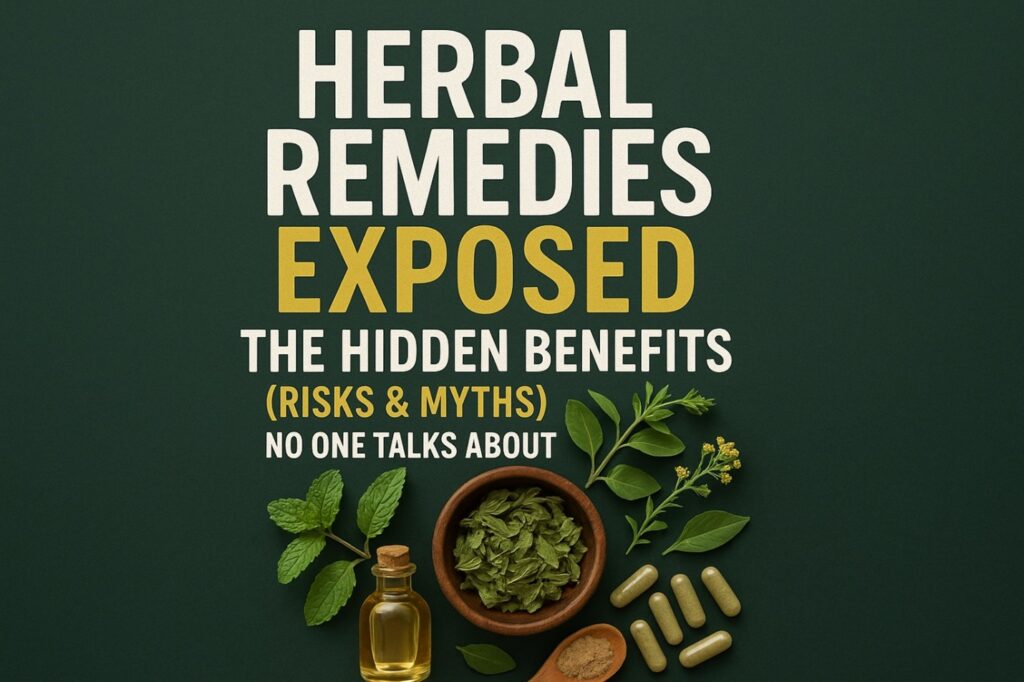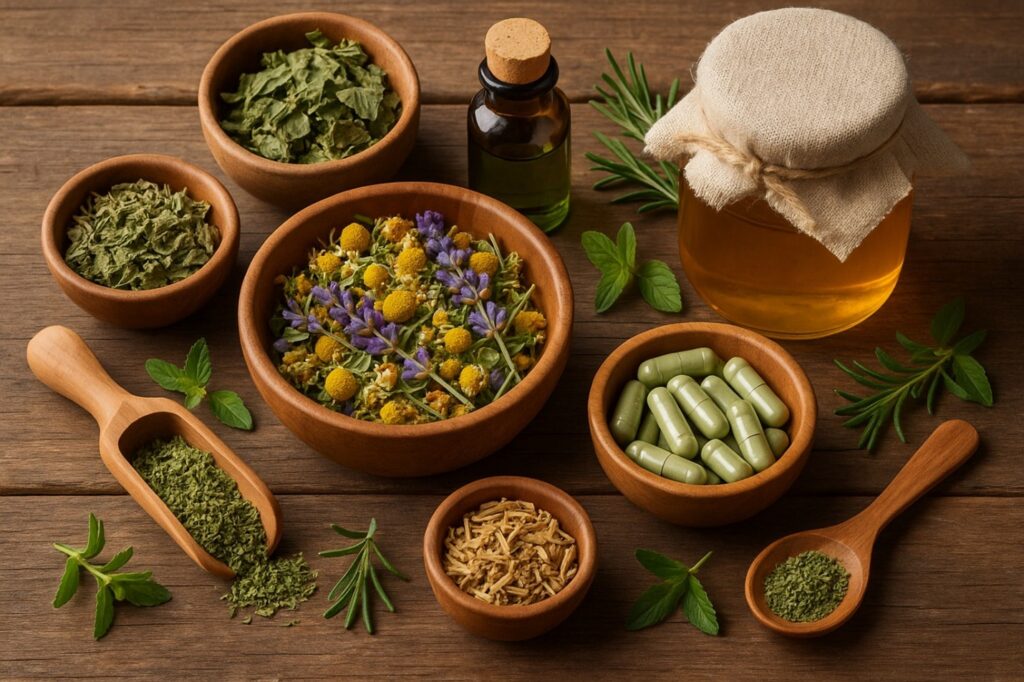Plants have been utilised as medicine for centuries. The ancient cultures made teas, mashes of roots, and dried leaves in order to treat not only headaches but also infections. Almost 80 per cent of the entire world population continues to use herbal remedies as their primary source of medical care. They have passed the time test- but do they hold up in our new fast-paced world?
Since the wellness trend is exploding, shelves in every store are stocked with herbal teas, supplements and tinctures. A lot of supposed individuals think that they are the less toxic and more natural of the two. However, there are some questions: Do they really work? Are they always safe? And what interpretation is misguiding us? This is the guide, and it will expose us to the hidden benefits of herbal remedies, unfold the potential dangers and avert the doubt, which people tend to guess at.

Are Herbal Remedies Really as Safe and Effective as They Seem?
The short answer: it depends. Other herbs are so effective, to an extent that they are the foundation of modern drugs. Aspirin, as an example, was initially prepared with willow bark, as is digitalis (heart disorders) prepared with foxglove. This demonstrates that the traditional herbal medicine has strong scientific foundations.
Not every herb is made equal, however. They can have varying efficacy with dosage, preparation and the person using them. Using chamomile tea is an example that could make one individual fall asleep at ease, but would have no impact on another.
The Safety Question
People use many of these to benefit, but when overused or misused, the herbs do not work out. St. John’s Wort, a mood stabiliser, is likely to interact with antidepressants. Kava root, which is occasionally used to treat anxiety, has been associated with liver problems in an uncommon case. Which is why natural herbal remedies should be given the same regard as pharmaceuticals; they may be natural, but they are still potent.
The Hidden Benefits of Herbal Remedies
There are benefits, even with the safety concerns, to the use of herbal remedies. Herbs, unlike drugs that have only one active ingredient, may have many active factors, which do not work individually, but in combination are much more effective.
Examples of Herbal Remedies Benefits
- Turmeric: The active ingredient (curcumin) lowers inflammation, promotes the health of the joints, and increases antioxidant activity.
- Garlic: Known to aid in the drop of blood pressure, maintain cholesterol levels, and support immunity.
- Chamomile: Soothing, has a sleep-like effect, and carries little or no clinical risk of low-grade anxiety.
The other secret advantage is nationwide access. Most of the safe herbal remedies at home can be located in your pantry. Ginger to treat nausea, peppermint to aid digestion, and lavender tea to calm down are cheap, simple solutions that do not take much effort.
Traditional Herbal Medicine: A Global Legacy
Herbal medicine is no longer a trend, and it is part of our common human experience.
Eastern Herbal Traditions
Chinese herbs (such as ginseng and ginkgo biloba) have long been used to promote energy and mental power. As stress relievers, balancers, and sources of vitality, Ayurveda emphasises ashwagandha, holy basil and turmeric in India.
Western Herbal Practices
The roots of elderberry, echinacea, and dandelion are a typical example of a staple immune stimulator and detoxifier in Europe and the Americans. Native people also taught remedies of area-specific plants.
Modern science is now proving the things that our forebearers understood long ago. Indicatively, the effects of chamomile can be quantified as calming. In contrast, the effects of echinacea can be quantified as immune-boosting. This demonstrates that there need not be a contest between herbal medicine and modern medicine; they complement each other when properly used.
At Healthabulous, we value integrity, as it entails combining evidence-based modern medical care with natural remedies to help people achieve optimal health.
Herbal Remedies for Common Illnesses
Most individuals use herbs in routine illnesses, and the outcomes might be exceptional. The following are some of the typical examples:
For Anxiety and Stress Relief
- The roots of ashwagandha and valerian relax the nervous system.
- Tea made of passionflower and lavender soothes tension and makes people relaxed.
For Immune System Support
- Elderberry and echinacea are used during cold and flu season.
- Garlic acts as a natural antimicrobial and immune booster.
For Digestion and Nausea
- Peppermint reduces indigestion and bloating.
- Ginger helps with nausea and stomach discomfort.
- Fennel seeds ease cramps and gas.
For Sleep Support
- Chamomile and lemon balm improve relaxation and encourage restful sleep.
These herbal remedies for common illnesses, coupled with good sleep, nutrition and exercise, are potent partners in day-to-day health.

Herbal Remedies Side Effects and Risks
Although the advantages are equally impressive, not every herbal remedy is safe. That something is natural does not imply that it is necessarily secure. Certain herbs react with prescription drugs, and others may lead to side effects in case of overdose.
Common Side Effects to Be Aware Of
- St. John’s Wort: May burn antidepressants, birth control pills or blood poison.
- Kava Root: It is used to treat anxiety, but it has also been associated with incidences of liver damage, which are rare.
- Liquorice Root: With excessive consumption, it may cause an elevation in blood pressure and reduce potassium.
This does not imply that all these herbs are unsafe. This means they are to be applied cautiously and preferably only with the advice of a qualified professional.
The Truth About Herbal Remedies and Health Risks
Misuse is usually the most significant risk. A lot of supplements available on the market are not regulated as harshly as pharmaceuticals. Bad quality goods can be contaminated, incorrectly labelled or even incorrectly dosed. This is why it is essential to select quality brands of herbal supplements and natural health products that are trustworthy.
Myths About Herbal Remedies
Falsehoods surrounding the herbal remedies, myths, and misconceptions are spreading very fast. Let’s clear up some of the biggest.
Myth 1: Herbal Remedies Are Always Safe
Not true. There are side effects and interactions with herbs as with pharmaceuticals. The safe use requires knowledge and tolerance.
Myth 2: Herbal Remedies Work Instantly
Some of the herbs (such as peppermint to relieve nausea) work with immediate effect, but most require accumulation in the body. The results are usually achieved on a long-term basis.
Myth 3: Herbal Medicine and Modern Medicine Can’t Mix
Another misconception. In practice, numerous physicians advocate a more moderate position, in which herbs do not substitute but supplement conventional treatment. e.g., taking ginger tea with mild nausea that may be combined with prescribed medicine.
Myth 4: All Herbal Remedies Are Backed by Science
Most of them are well-researched, but not all herbs are well-scientifically proven yet. Other traditions depend more on anecdotal usage, with research underway.
The busting of these myths can help us to view traditional herbal medicine more realistically.
How to Use Herbal Remedies Safely
The many benefits of herbal remedies are best enjoyed when there is safety first.
Tips for Safe Herbal Remedies at Home
- Do Your Research: Learn about the herb, its benefits, and its risks before using it.
- Start Small: Begin with low doses to see how your body reacts.
- Watch for Interactions: If you’re on medication, check with your healthcare provider before adding herbs.
- Buy High-Quality Products: Choose supplements tested for purity and potency.
- Stick to Trusted Sources: Brands with third-party certifications are usually more reliable.
Having an alternative medicine, such as herbal remedies for common illnesses, can supplement your well-being rather than substituting traditional medicine.
To get more guides on safe and effective natural wellness strategies, visit Healthabulous.
Conclusion
Herbal remedies are full of hype and good intentions. On the one hand, they have amazing health advantages, such as relieving stress, enhancing immunity and improving digestion. On the other hand, underestimating the risks or being subjected to mythology can lead to trouble.
The key is balance. Herbs can be a great ally, and especially when taken together with modern medicine, they can be of great value. However, these are not magic pills, and applied judiciously, they can aid you in leading a healthier and balanced life. Understanding the truth about herbal remedies and health risks will help you make better use of them and also avoid risking your life.
In case you want to dive deeper into natural solutions and wellness information, visit the latest guides at Healthabulous.
FAQs About Herbal Remedies
1. What are the most commonly used herbal remedies?
Some of the most popular include chamomile, turmeric, garlic, peppermint, echinacea, and ashwagandha.
2. Are herbal remedies safe to take every day?
Some herbs are safe for daily use, while others are better taken occasionally. Always check dosage guidelines and consult with a healthcare provider.
3. Can herbal remedies interact with prescription medications?
Yes. Herbs like St. John’s Wort and ginkgo biloba may interfere with certain medications, so always ask your doctor first.
4. Do herbal remedies actually work?
Yes, many are backed by research, though results vary depending on the herb, dosage, and individual.
5. What’s the best way to get started with herbal remedies?
Start with familiar herbs such as chamomile, ginger, or peppermint. Use them in teas or cooking before moving on to concentrated supplements.







